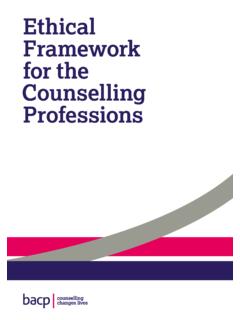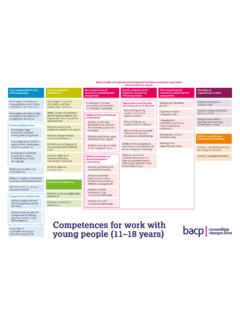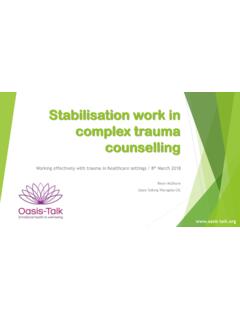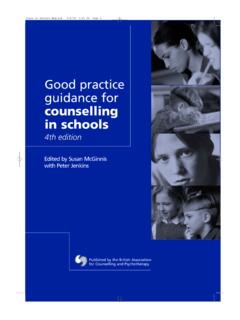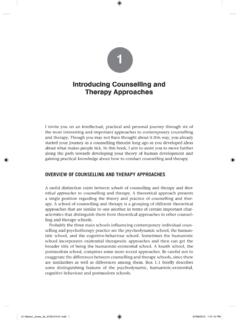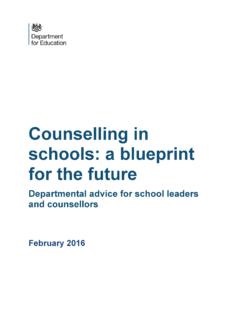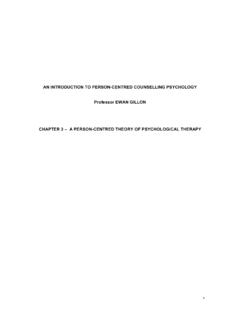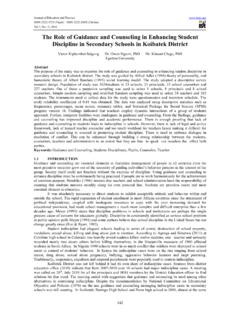Transcription of School counselling for all - BACP
1 School counselling for all Britain is falling behind in promoting wellbeing in children . The Children's Society, UNICEF (2010). School counselling for all Nearly 80,000 children and young people in Great Britain are seriously depressed and around three children in every class in the UK have a diagnosable mental health condition. Experiencing a mental health problem in childhood is one of the biggest barriers to achieving well-being What is School -based and yet only one quarter of children affected are counselling ? getting specialist help (Green et al, 2005). School -based counselling is a professional activity, counselling in schools has been shown to be delivered by qualified practitioners in schools. a highly effective support for tens of thousands Counsellors offer troubled and/or distressed of troubled children and young people who are children and young people an opportunity to experiencing emotional health difficulties.
2 The Welsh explore and understand their difficulties within a Government's national School -based counselling relationship of agreed confidentiality. strategy has been shown to be an overwhelming success, so much so that counselling in Welsh School -based counselling is one of the most secondary schools is now a statutory service. prevalent forms of psychological therapy for children Despite this, access to School -based counselling and young people in the UK with between 70,000 . services in England for many is problematic. 90,000 cases seen in UK secondary schools each year. However, provision is inconsistent and While children in Wales and Northern Ireland are many children in England do not have access to a supported by national School -based counselling counsellor in their School . programmes, funded by their governments, England lags behind. This leaves many distressed young people without any access to much needed The facts: children's mental therapeutic support in their schools.
3 Health in the UK. BACP wants to see parity across the UK, with all children and young people having access to n 20% of children have a mental health counselling services within their schools. problem in any given year, and about 10% at any one time (Mental Health Foundation, 2005). That is around three children in an average class. n Between one in 12 and one in 15 children and young people deliberately self-harm (Mental Health Foundation, 2006). n More than half of all adults with mental health problems were diagnosed in childhood. Less than half were treated appropriately at the time (Kim-Cohen, Caspi and Moffitt, 2003). n Around three-quarters of children who develop a mental illness are unknown to any services (CMO, 2013). 01 School counselling for all BACP 2015. We want schools to provide more support to young people who are suffering stress, anxiety and depression, including access to counselling .
4 Young Minds (2014). Current provision of School -based counselling Across the United Kingdom provision of School - In addition, the Department of Health's (2015). based counselling is inconsistent; Wales has report Future in Mind: Promoting, protecting legislated to ensure statutory provision of School - and improving our children and young people's based counselling to all Y6 pupils and all 11 18 mental health and wellbeing highlighted years olds; whilst the Government of Northern counselling services as a valuable complement Ireland provides ring-fenced funding to ensure all to CAMHS. The Health Select Committee also post primary School children, and those in special stated that schools have enormous potential to schools, are able to access counselling services. help address emerging mental health issues in children and young people (2014). The Department for Education's (2015) report, counselling in Schools: a blueprint for the future, Despite the recent acknowledgments from sets out an expectation from government that all the Department of Health and Department for schools in the future should provide access to Education about its importance, there has been little counselling services.
5 It outlines how counselling movement towards a policy of universal provision within secondary schools has been shown to for School counselling , and coverage in England bring about significant reductions in psychological remains patchy. distress in the short-term, and helps young people move closer towards their personal goals.. The Taskforce on Mental Health in Society (2015) The Mentally Healthy Society: The report of the Taskforce on Mental Health in Society n All children should be able to access professional, qualified counselling and therapy services in their School or college in age-appropriate form . n School -based provision tends to be well-suited to offering the type of lower-level intervention that can be hard to access through formal CAMHS, but which can prevent problems subsequently becoming more serious . n School -based provision is highly accessible, avoiding lengthy or complex referral processes, and waits tend to be relatively short.
6 School is also where young people already are during the day, and crucially is where they say they want to access services: over two-thirds say they would rather see a counsellor at their School as opposed to outside . n Because schools are a universal service, accessing provision in schools can help to overcome any perceived stigma or reluctance to attend mental health services. For these reasons, School -based services such as counselling tend to have high take- up, and there is evidence that young people are more likely to access School -based mental health services when compared with non- School -based ones.. BACP 2015 School counselling for all 02. Case study: Jenny's story Jenny had been a happy, intelligent, high achieving 14 year old. However, when she returned to School after the Christmas break her Form Tutor noticed she had become quiet and withdrawn not her usual self. The tutor monitored this for the first week of term and then asked Jenny if everything was OK.
7 Jenny refused to engage with the tutor, which was unlike her, and dismissed the issue saying nothing was the matter. Not knowing if this was a phase of adolescence, the tutor decided to keep a watching brief over the following week. In the third week of term, the tutor was approached by Jenny's PE teacher who said that Jenny had refused to do PE since the start of term, and had come up with a myriad of reasons why she shouldn't. Jenny had also not returned to lunchtime netball club. talking with the counsellor that the lack of eating Again the tutor tried to address the situation wasn't going to help her really. with Jenny, but she refused to talk or explain her actions. At the end of this somewhat The School counsellor had a very good working one-sided conversation, the tutor reminded relationship with the local specialist CAMHS. Jenny that the School was fortunate to have team and suggested to Jenny that they may a School counsellor with a private room in be able to help.
8 With Jenny's permission, the the Pastoral Block, and that Jenny could counsellor rang her specialist CAMHS contact, easily get an appointment if she thought and through this communication Jenny agreed that it might help to talk to someone that she would like some expert support for her independent. Jenny asked if the meeting eating issues. She also thought that having the would be confidential, and the tutor assured counsellor talk to her Mum about the possible Jenny that whatever was discussed would referral would be easier than raising it herself. be private between her and the counsellor, unless the counsellor felt that someone was Four months at risk of significant harm. Jenny is now back on track in School , and Jenny agreed that she'd like an appointment, home life is settling down. and one was made for her the following week. She is having appointments at CAMHS with During counselling Jenny talked about the her Mum, and her eating habits are under breakdown of her parents' marriage over control.
9 The specialist help that CAMHS offered Christmas and the new living arrangements that was effective and timely. It is likely that she she and her brother were subjected to. She felt will soon be discharged. She still sees the better having someone she could trust to talk School counsellor weekly, between her monthly to, and her mood around School began to lift a CAMHS appointments, and in these sessions little. In the third week of counselling however, she talks through practical things she does Jenny told the counsellor that since Christmas, to help her manage School , home life, and she had been controlling her eating very carefully. eating; and also her feelings about her parents'. She was skipping lunch at School and making forthcoming divorce. CAMHS and the School excuses not to eat at home. She described how counsellor have an arrangement, agreed with this helped her cope with her current situation, Jenny and the family, that all parties can liaise and also she was worried she was still too and communicate with each other, as and fat.
10 She didn't want her teachers or friends when necessary, for the benefit of Jenny's care to know about this but began to realise in and recovery. 03 School counselling for all BACP 2015. counselling within secondary schools has been shown to bring about significant reductions in psychological distress in the short-term, and help young people move School -based counselling : closer towards their personal goals.. the evidence base Department for Education (2015). n There is evidence to suggest that targeted School -based interventions have led to improvements in wellbeing and mental health, yielding reduced levels of School School -based counselling is exclusion by 31% and improved pupil attainment (Banerjee et al., 2014) cost-effective n Research indicates that School -based counselling is perceived by children and Expanding and improving access pastoral care staff as a highly accessible, to services such as [ ] School - non-stigmatising and effective form of early- based counselling , talking therapies intervention for reducing psychological distress and early intervention services is a (Cooper, 2009).
